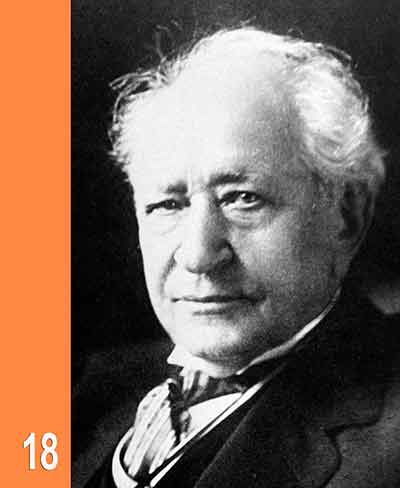Edward B. Stahiman
Induction Year:شوف1973
Lived:شوف1843-1930
Papers: Nashville Banner
Edward B. Stahiman, who rose to a position of wide influence in both publishing and transportation, did not start out to be either a newspaperman or a railroader.
He was just 10 when his family moved from Germany to West Virginia in 1853. Several years later his education was interrupted when he had to go to work to help support the family following his father's death. The only job available was as a cart driver for the Baltimore and Ohio Railroad. He was in the crew that was sent to Tennessee in 1863 to help rebuild the Louisville and Nashville Railroad tunnel near Gallatin which had been blown up by Morgan's Raiders in the Civil War.
In 1866 he accepted a position with the Southern Express Company and became a permanent resident of Nashville. He returned to the Louisville and Nashville Railroad and during the next dozen years he held successively more important positions with the company, serving as general freight agent and twice as vice president. He left railroading for a year when he purchased the Nashville Union Stockyards in 1881. That same year he acquired a minority stock interest in the Nashville Banner. He sold the stockyards and returned to railroading, but he did not sell his newspaper interest. In 1866 he acquired a major holding in the Banner.
Because of his vast railroading experience, he was named Commissioner of the Southern Railway and Steamship Association and represented Southern and American newspaper publishers in their continued battle with the Post Office Department over rates governing second-class mail. Stahlman became the majority stockholder and active publisher of the Banner in 1893, and until his death in 1930 he devoted his considerable energies to revitalizing his newspaper and extending its influence as a champion of right and justice.
His editorial campaigns are legendary. He took on and defeated such formidable opponents as U.S. Senator Luke Lea and all of state government when he fought against Nashville's subscription of 51 million to the Tennessee Midland Railroad and the Tennessee Central Railroad. Stahiman was a tireless advocate of a free and independent judiciary and used the Banner's powerful editorial influence to work for judicial reform in the state.
Although he had once been elected a Nashville alderman and served on the Board of Education twice, Stahiman later as a publisher declined an appointment to the U.S. Senate on the "grounds that no newspaper publisher should hold elective office." As a publisher he was one of the founders of the Associated Press and was active in numerous other press groups such as the Southern and American Newspaper Publishers Associations.
